You are looking for the ideal Zero Waste basic equipment? Then you've come to the right place! Plastic waste in the environment is one of the greatest ecological challenges of our time and costs the lives of millions of animals every year. Our health is also at risk, as the plastic enters the food chain. In addition, mixed plastics in particular are difficult to recycle - not to mention the high energy consumption involved in recycling.
More and more people are therefore consciously paying attention to avoiding packaging waste, but also food waste and other waste. The Zero Waste Lifestyle has finally evolved to include natural Conserve resources.
In this article, I would like to introduce you to exactly those things and tools that belong to the absolute zero waste basic equipment, because they simplify the waste-avoiding everyday life enormously. Whether you're out and about, shopping, in the kitchen and bathroom, or cleaning. Let's go!
On the road: what counts as the best zero waste basic equipment away from home?
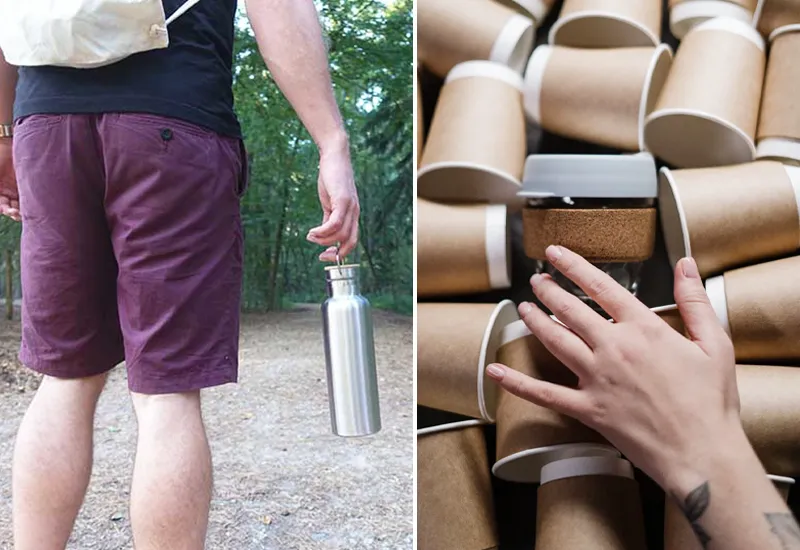
Away from home it is now and then difficult not to make trash. Therefore, here are some items that make it extremely easy for me personally, even on the road, Avoid plastic waste.
1. Drinking bottle
Let's start with the reusable Stainless steel drinking bottle or glass. You can just get them fill up with tap water before you leave the apartment. You can also fill them up in many cafes and restaurants, so you don't have to buy packaged water in plastic bottles anymore.
This water bottle* I use personally. I can only highly recommend them to you.
Tip: You are also welcome to check out the Drinking bottles comparison view in which I have identified the best reusable bottles.
2. Reusable cup
With an insulated reusable cup you avoid above all infinite waste due to disposable CoffeeToGo cupswhich is a real symbol of our Disposable society are. It definitely belongs in every zero waste basic equipment.
This reusable cup* I can warmly recommend it to you.
3. Backpack
Forget the paper and plastic bags and just throw on a durable backpack when you go out. In it you can, for example, (spontaneous) purchases without packaging waste or also transport prepared meals filled in lunch boxes more easily.
This backpack from GOTBAG* I have for many years. He is super stable and is made from marine waste. Therefore, it is recommended in both senses.
Tip: Learn even more ideas for the road in the Zero Waste Journey Article know
Kitchen: What belongs to the Zero Waste basic equipment in the kitchen?
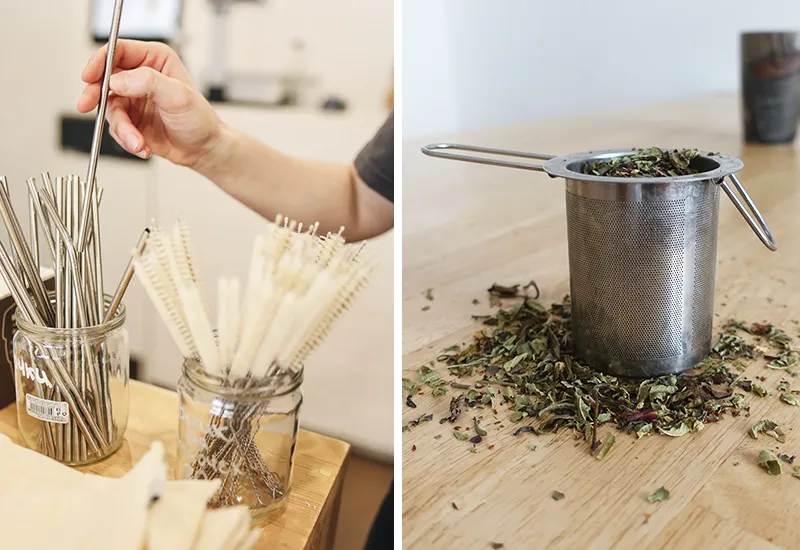
Now it's time to go home again! Much scope for waste avoidance offers especially the kitchen. The following tools are extremely helpful.
4. Oilcloths
Classic oilcloths make it easy to say goodbye to aluminum foil and cling film. Because with them you can keep food wonderfully fresh. After use, you rinse them briefly, so they can be reused forever.
These oilcloths* we use for a long time in our kitchen.
Good to know: By the way, beeswax wipes are deliberately not in my personal Zero Waste basic equipment, because they are not vegan. Why vegans:inside avoid bee productsI explain this in the linked article.
5. Tea strainer
Disposable tea bags also make a lot of waste and are not always biodegradable. By investing in a Stainless steel tea filter you avoid this waste, as you can simply make your tea boil with loose leaves simply by following your heart.
This tea strainer* I've been using it myself since I started consciously avoiding plastic waste.
6. Reusable straws
With reusable Stainless steel drinking straws, glass or bamboo wood in the kitchen will be Disposable straws (plastic or paper) at once superfluous.
You can of course also take along on the way and use it whenever it is convenient. In any case, there are hardly any other disposable products for which there are so many environmentally friendly alternatives.
This stainless steel drinking straws* are part of my Zero Waste basic equipment.
And if you prefer to sip from glass straws, I can give you this classic from HALM* recommend
Tips: More advice and Ideas for a kitchen as plastic-free as possible By the way, I've compiled a list of the most important Zero Waste tools in the linked blog article.
Shopping: What belongs to the Zero Waste basic equipment for waste-free shopping?
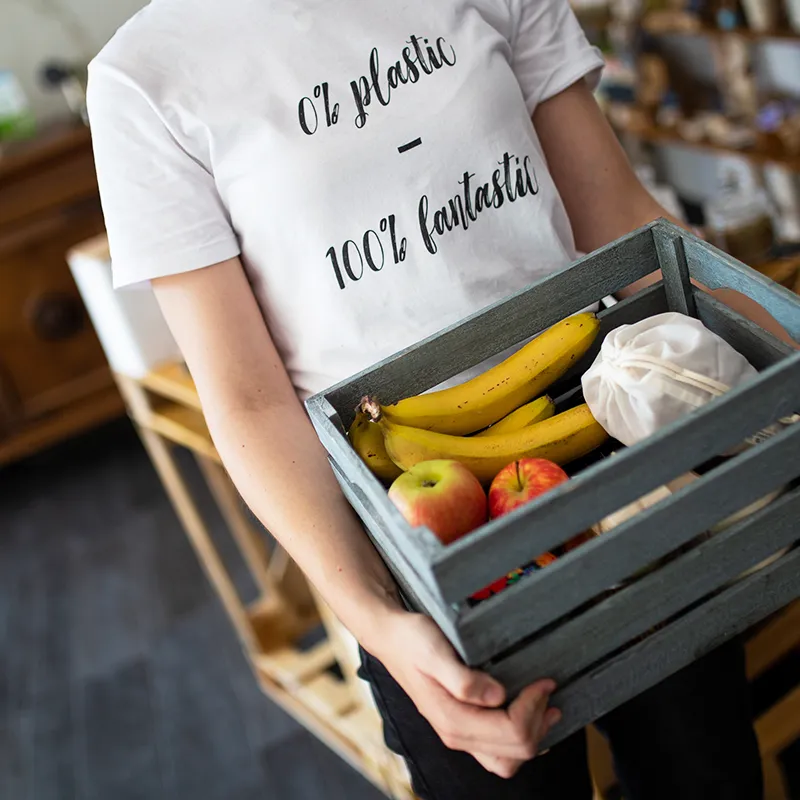
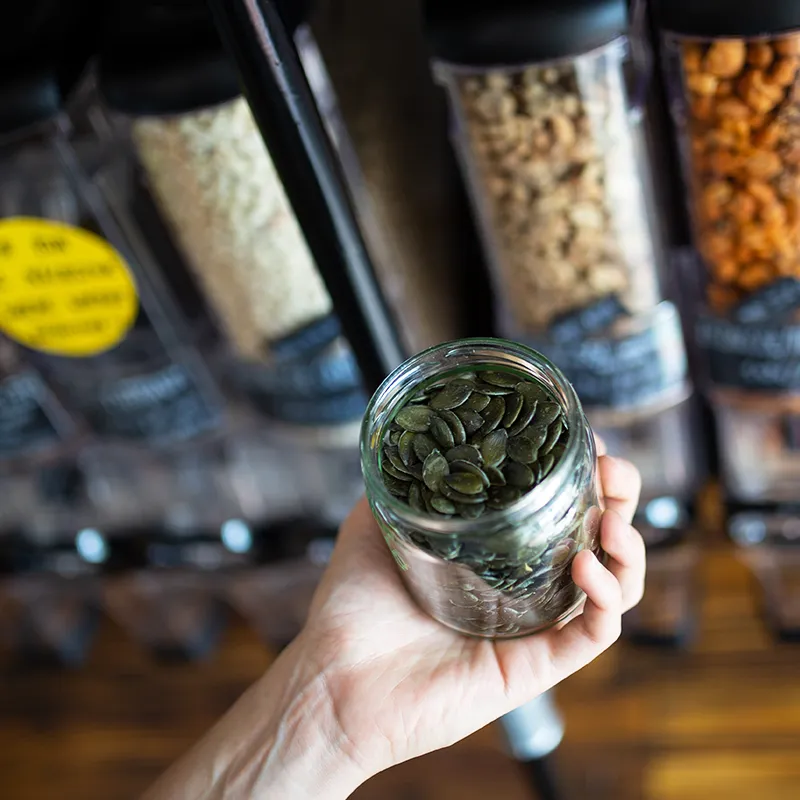
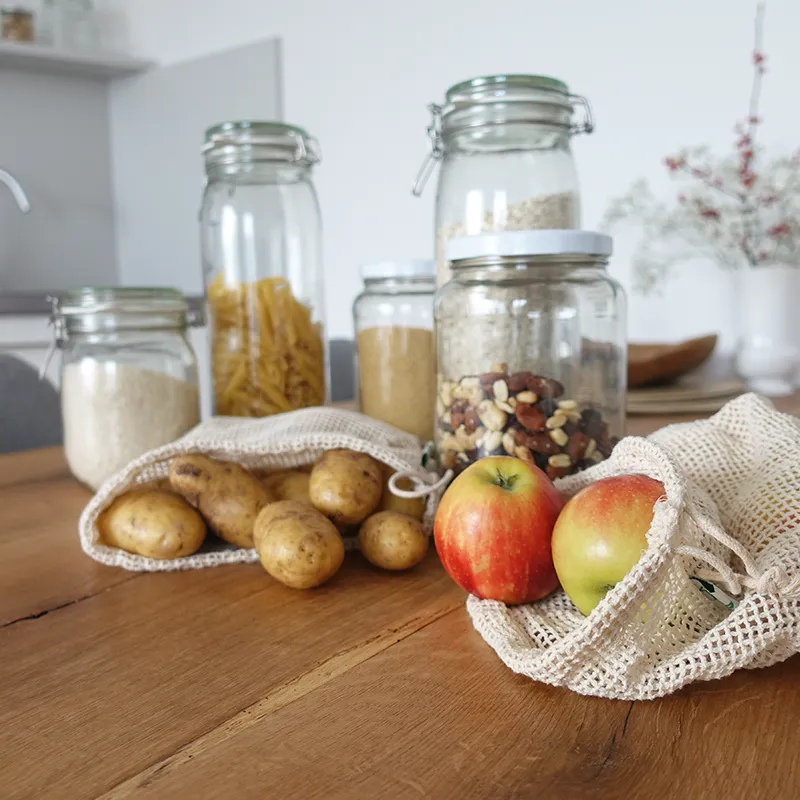
The plastic free shopping is always so hard for you? Here are some things from my Zero Waste basic equipment, which you especially the Buying food without waste much easier in the future be
7. Stainless steel boxes
In practical Stainless steel lunch boxes dry snacks, but especially moist meals can be safely stored and transported. If you prepare your food at home, For example, you save the ToGo garbage at the snack bar during the lunch break.. Of course, the tins are also ideal as a substitute for cling film.
These two stainless steel lunch boxes* I've been using it since I started trying to live as plastic-free as possible.
8. Canning jars and containers
Classic Preserving jars (and other containers with lids) are among the most important zero waste tools because they both reduce the Purchasing as well as the storage of dry goods (e.g. oatmeal, legumes, pasta or dried fruits) facilitate.
This set of many glasses* makes it much easier for you to get started.
9. Fruit and vegetable nets
To avoid the waste caused by the free, thin plastic bags at supermarkets and organic food stores, reusable Fruit and vegetable bags from organic cotton ideal. They are light, can be knotted and last an eternity.
These fruit and vegetable nets* I can highly recommend it from my own experience.
10. Cloth bag
Classic fabric bags or carrier bags are also "unbreakable" and make shopping, for example at the bakery or the weekly market, much easier. Buns, bread and the like, for example, can be perfectly placed inside and transported, so that short-lived paper or plastic bags become even more superfluous.
These jute bags* I can recommend them to you. They're especially useful if you're just doing a little shopping or aren't on the road for too long.
11. Shopping basket
A traditional shopping basket is not only a visual highlight, but also allows you to carry your To transport purchases without waste. This makes it much easier to buy food without packaging - and you can also do without the plastic bag.
This shopping basket* we always use because it can also be squeezed relatively space-saving and just not as rigid as a classic wicker basket.
Body care: What does the ideal zero waste basic equipment in the bathroom look like?
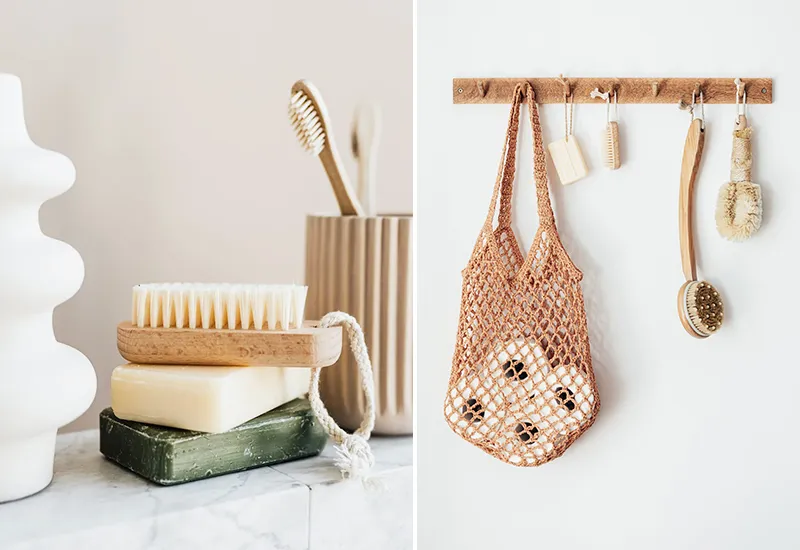
Now we come to personal hygiene in the bathroom, where, as is well known every day a lot of disposable plastic waste is produced can. With the right basic equipment, you can get ahead of the Zero Waste Bathroom but much closer. What things should not be missing, I would like to show you now.
12. Wooden toothbrush
For the conventional plastic toothbrushes, there are with the Wooden dental bridges (mostly from fast growing bamboo wood) a green alternative to avoid plastic waste. After disposal, the style can still be reused as a climbing aid for plants, for example.
Dthese wooden toothbrushes* I can really recommend it to you, since I use it myself.
13. Solid soap for skin and hair
Bar soap belongs in every Zero Waste basic equipment, since thereby incredibly much Avoid waste from the plastic bottles of shampoos and shower gels lets. The solid soaps are easy to use and can be stored, for example, in a soap box or hanging in a Soap bag dry and transport.
This hair soap from NICAMA* is my personal favorite. (see Hair soaps comparison)
For skin care I use for some time now this natural soap from Meina*.
14. Reusable cotton pads
Disposable pads are arguably one of the biggest waste generators in the bathroom. But whether for skin care or makeup removal, washable, reusable cloth pads are the ideal, waste-avoiding alternative.
These cotton pads* are absolutely recommendable.
15. Metal razor
Reusable Stainless steel razor plane Have a long life and reduce the waste in the bathroom caused by Disposable razors and their razor blades is created. A real must for anyone who wants to avoid plastic waste.
This razor* I can highly recommend it to you, for example.
16. Dental floss
Also Nature dental floss in a refill pack represents one of many important utensils of the Zero Waste lifestyle. Plastic dental floss in the plastic packaging can be wonderfully saved by this.
This dental floss* I can recommend to you.
17. Menstrual cup
In the ladies' world, the menstrual cup in particular is part of the Zero Waste basic equipment, as it is a cheap and ecological alternative to disposable products like sanitary napkins represents. It is comfortable, discreet and can be used for many years.
This menstrual cup* is one of the best and arrives plastic-free.
Cleaning: What counts as a Zero Waste staple when cleaning and washing?
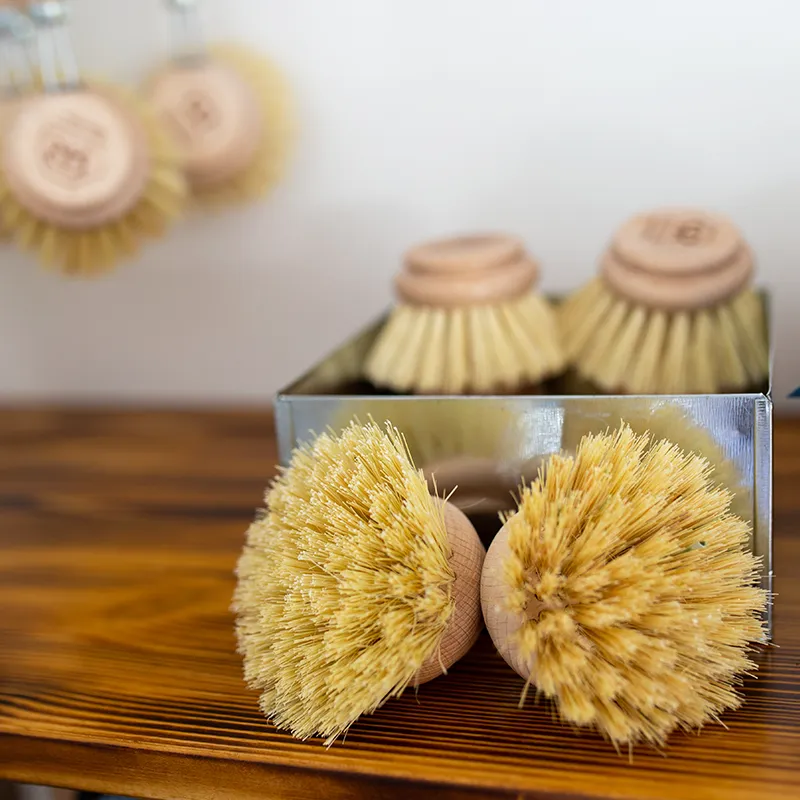
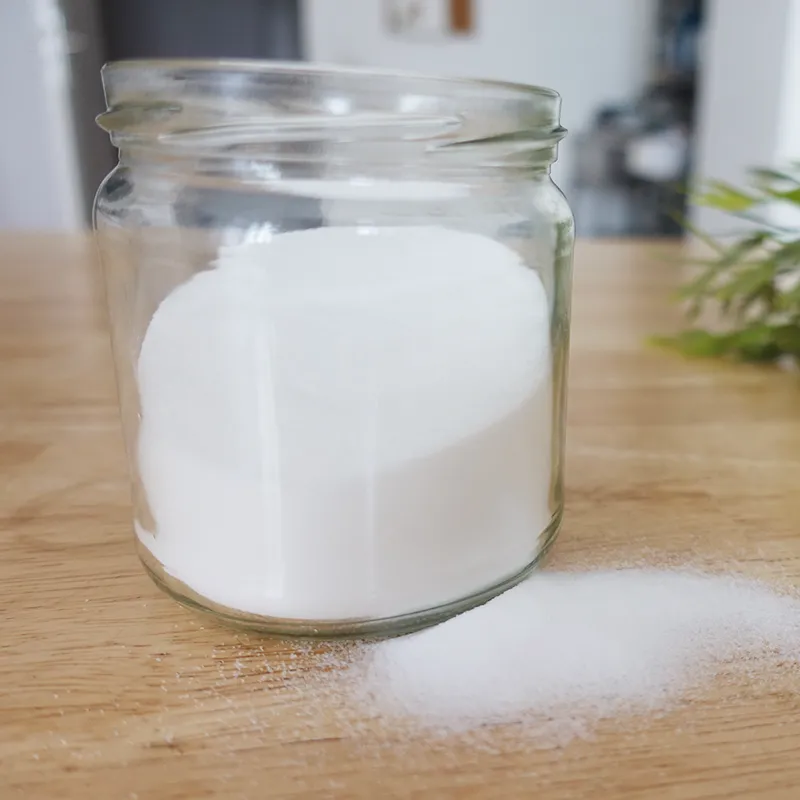
Experience shows that a lot of waste is also generated at home during cleaning and washing. For example through Plastic bottles of detergents, by rinsing and cleaning sponges or by disposable cloths..
Here are some things that will also give you the Zero Waste Cleaning significantly easier.
18. Baking soda, curd soap, washing soda, citric acid and vinegar essence
It only takes a few home remedies to make an entire drugstore and lots of plastic waste obsolete. These include for example Citric acid, Baking sodacurd soap, washing soda and vinegar essence. The combination of the means is extremely helpful in the project "Zero Waste".
Here you will find my recommendations, as well as practical application examples:
- Curd soap* (e.g. against stubborn stains on surfaces or in clothing).
- Citric acid* (e.g. as a descaling agent, fabric softener or pot cleaner).
- Washing soda* (e.g. against clogged drains or as a toilet and upholstery cleaner).
- Vinegar essence* (e.g. as a descaler or to remove fly dirt).
- Baking soda* (e.g. as window, drain and toilet cleaner or odor remover).
19. Cloth towels
Cloth towels are versatile and a sustainable and waste-avoiding alternative for countless disposable paper products.
Thus, in particular, it can be used to purchase the typical Avoid kitchen paper on the roll in the plastic film. In addition replace Cloth napkins the familiar paper napkins to throw away and Cloth handkerchiefs the classic paper towels for blowing your nose.
This cleaning cloth set* I can fully recommend it to you. In addition, for example these handkerchiefs* and these organic cotton napkins* a good choice for your basic equipment.
Tip: You can also make your own cloth towels from old t-shirts or shirts in a relatively uncomplicated way and avoid even more waste.
20. Wooden dishwashing brushes
With the help of durable Sink brushes from beech wood you replace the cheap plastic brushes that often end up in the garbage can. The life of the brushes with natural bristles of Union and Fibre is much longer. And if at some point it stops working, you can simply replace the rinsing head and continue to use the style.
By the way, the following also count for me Bottle brushes to the Zero Waste basic equipment, because I can wonderfully use my Rinse drinking bottle and can clean.
This wooden dish brushes* and this bottle brush* I have been using for a long time.
Know the ideal Zero Waste basic equipment and use it to reduce waste
Whether on the road, in the bathroom, cooking or cleaning: With the right basic equipment, you'll not only make it easier for yourself Start as a Zero-Waste Beginner much easier to avoid unnecessary waste.
In the end, the Switching to long-lasting reusable alternatives not only the environment, but also your wallet.
"What we do today will determine what the world looks like tomorrow."
Marie von Ebner-Eschenbach, writer (more at Zero Waste Quotes)
Do you have any questions or suggestions? Which items do you think still belong in the zero waste basic equipment? Just drop me a note in the comments.
Stay clean,

PS: In another article I gave you a List of my best Zero Waste tips compiled. I'm sure many of them will help you make even less trash. Good luck!

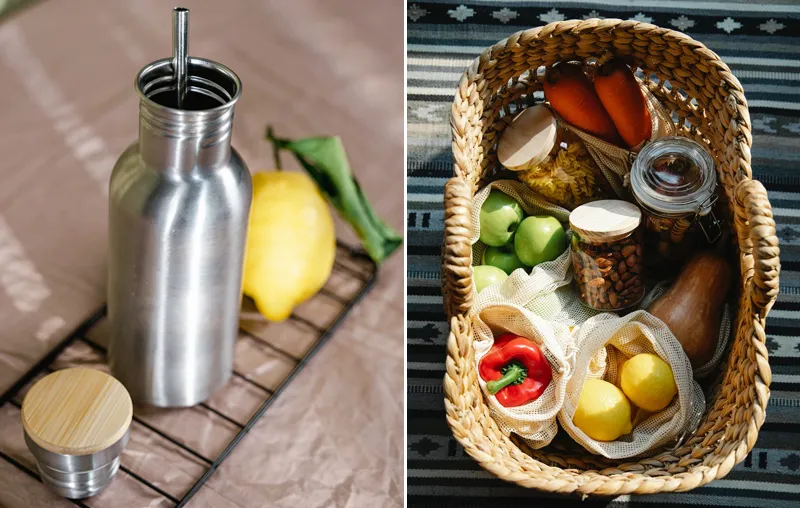
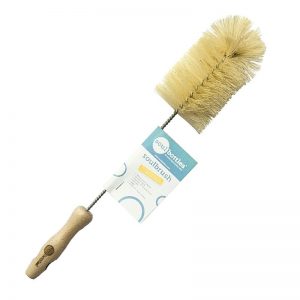
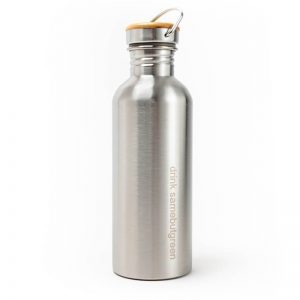
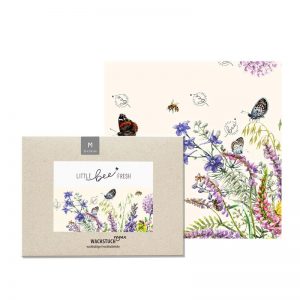


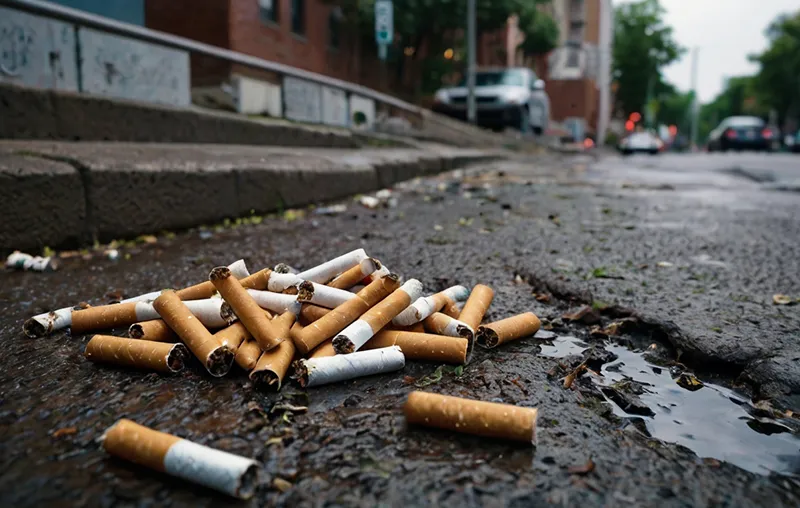
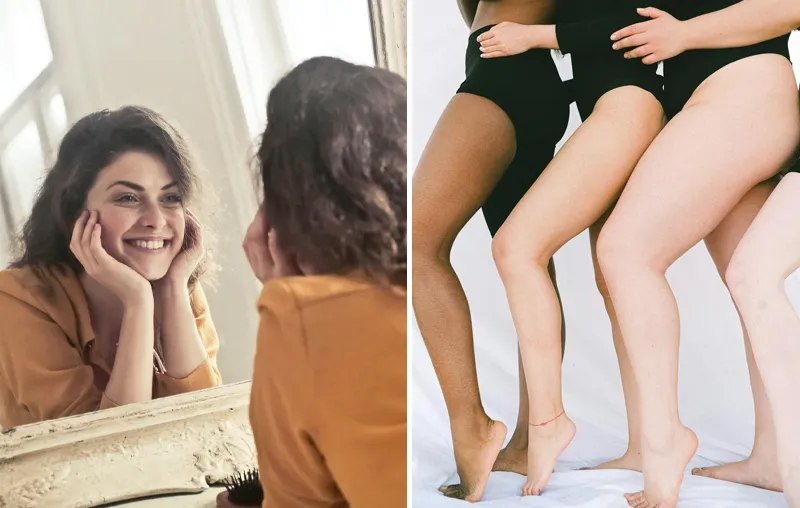

Beim Thema Waschen und Putzen vermisse ich einen Tipp in Richtung Wäsche waschen / pflegen, was einen großen Teil des Waschens und Putzens einnehmen kann.
Waschbrett / Waschmaschine, Waschnüsse / Waschmittelpulver, / Tabs, Wäscheleine / Trockner, sauber zusammenlegen / bügeln, vorbehandeln, lüften / waschen, …
Natürlich kann man den Bogen hier noch weiter spannen und über online- oder vor-Ort-shopping, über Neu- oder Second-hand-Ware reden und über Textilmaterialien (Polyester / Baumwolle…).
Hallo Isabella! Guter Punkt! Nehme ich mit in die Planung fürs nächste Artikelupdate. 🙂
Many greetings
Christoph
Hi, I find the article very worth reading. However, the plastic dental floss is still missing a useful alternative.
Hi Lukesch! Look' times in the Plastic free store there you will find the Dental floss without plastic 🙂
Many greetings
Christoph
Hi, Great article. I'm just switching to plastic free. So either I read it over or you have forgotten a totally simple yet important. (Except for the bread). Shopping bags made of fabric. Not only for bread and rolls or vegetables. But generally to take shopping. :-). Keep up the good work.
Hi Tamara! Haha, danke – sind aber eigentlich dabei unter „Stofftaschen“ 🙂
Have fun and best regards,
Christoph
Except for the oil pulling and aluminum madness, very worth reading and emulating. A question to the author: I read again and again that you should mix sodium bicarbonate and an acid like citric acid or vinegar together. According to my chemistry knowledge from the old days, this is nonsense, because then an exothermic acid-base reaction (foaming, bubbling) takes place and in the end one part sodium acetate or citrate plus one part water comes out. What good is the acetate or citrate supposed to do then, since it is neutral? Acid and base are then neutralized, aren't they?
Hello Jörg,
Thanks for the comment.
Natron, Zitronensäure und Essig gelten als nützliche Reinigungsmittel im Haushalt, da Natron beispielsweise Gerüche neutralisiert und Säuren wie Zitronensäure zum Beispiel Kalk entfernt. Oftmals gelten sie als das perfekte „3er Pack“, die jedoch einzeln angewendet werden sollten (Zitronensäure und Essig können jedoch vermischt werden). Vielleicht wird es einfach häufig verwirrend ausgedrückt. 😉
Da Laurinsäure antibakteriell wirkt, ist Ölziehen sinnvoll (nachzulesen hier: Mary enig, health and nutritional benefts from coconutoil: an important functional food for the 21th century, presented at he AVOC lauric oils symposium, ho Chi Mi City, Vietnam 25.04.1996.). Was für Auswirkungen Aluminium genau auf den Körper hat, muss immer noch erforscht werden, allerdings lohnt es sich doch darauf zu achten, denn einen Verlust erhält man dadurch nicht. 😉
Love greetings
Tabea
I love these new (often old and rediscovered) ideas. It helps me and my family to live more and more plastic-free! A wonderful feeling, even if it is only a tiny step. But we are leading the way and more are coming! Thank you for this!
Hello Bianca,
Freut mich, dass dir der Artikel gefallen hat! 🙂 Toll, dass du das Thema Zero Waste mit der ganzen Familie angehst.
Love greetings
Tabea
Comments are closed.